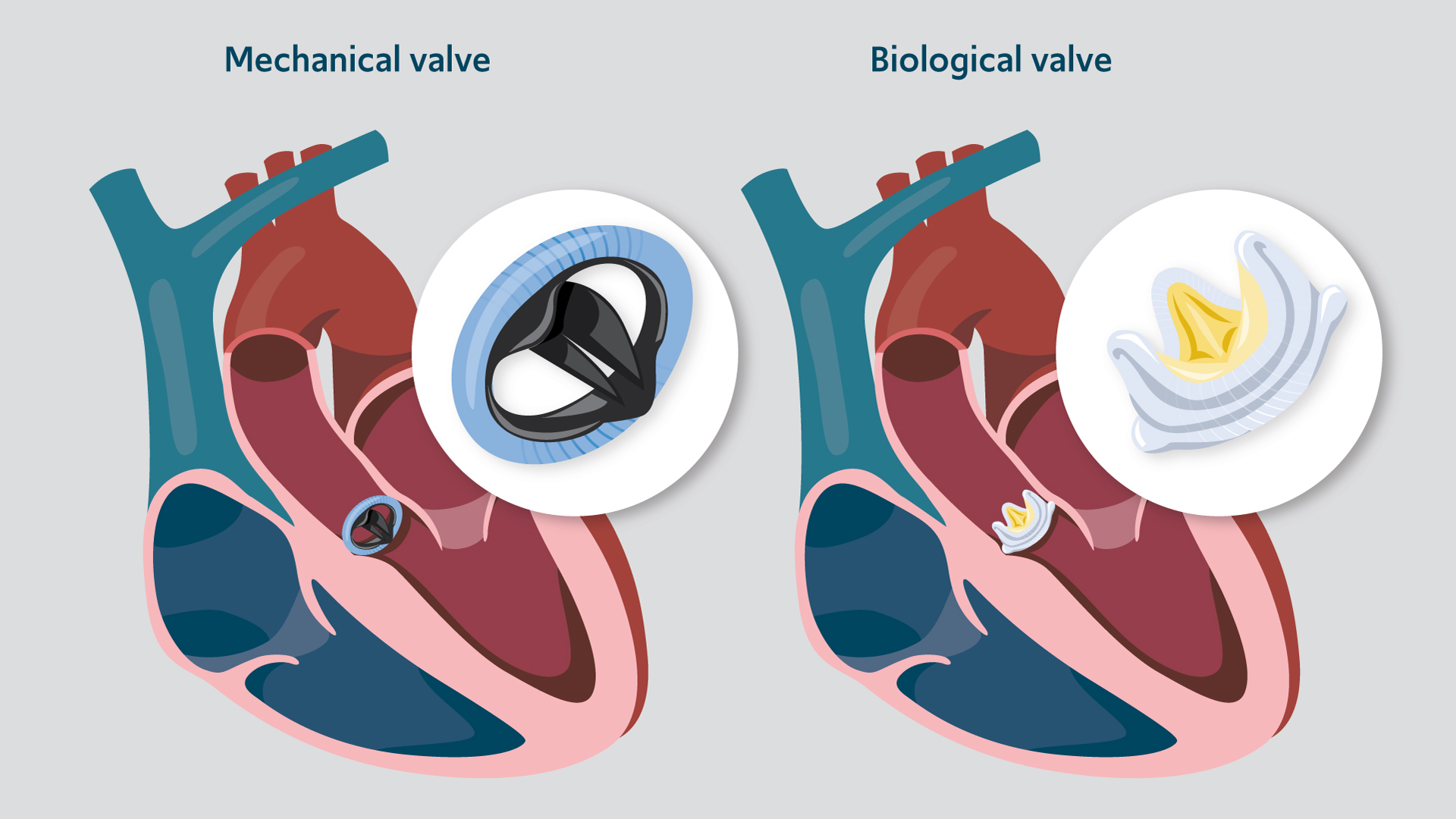Heart valve replacement surgery involves removing a damaged or diseased heart valve and replacing it with a prosthetic valve made from synthetic materials or animal tissue.
“Heart valve replacement surgery will reduce symptoms and improve the quality of life for most people. But valve surgery isn’t free from risk. Valve replacement is major open-heart surgery, and patients take time to recover.”
“When considering valve replacement surgery, you need to balance the benefits and risks of the procedure and look at alternative treatment options,” explains consultant cardiac surgeon, Mr Shahzad Raja.
How serious is heart valve replacement surgery?
Several factors make heart valve replacement surgery a significant operation.
- how long does it take? Surgery takes several hours, usually a minimum of two to three hours. You will have a general anaesthetic and will be asleep during the procedure
- sternotomy scar: The surgeon will make an extended cut down your breastbone so that they can operate on your heart. This is known as a sternotomy. Recovery following a sternotomy typically takes around two months, but some people have problems with ongoing discomfort. Some surgeons can use keyhole surgery techniques and different ways of accessing the heart to avoid the need for a sternotomy
- bypass machine: During surgery, you will be attached to a heart-lung bypass machine that will take over the work of your heart and lungs while the surgeon is operating
- ICU care: Following the surgery, you’ll spend time recovering in the ICU. The team will closely monitor you for 24-48 hours to ensure you’re stable and that there are no complications
- hospital recovery: You will need time in the hospital to recover and rehabilitate. You will have some pain and discomfort but will be offered regular painkillers to maintain your comfort. Typically, patients having valve replacement surgery stay in hospital for seven to ten days
- home recovery: Full recovery following the operation takes between two and three months, but this varies between individuals. If you are frail, have poor mobility and don’t have support at home, you may need time in a convalescent home after discharge from the hospital
Complications after heart valve replacement
“The risks of surgery depend on your age, fitness, the severity of your valve problem, and general health. The specialist team will monitor and support you throughout your surgery and recovery and minimise the chance of complications,” explains Mr Shahzad Raja.
The risks include:
- infections: Infection can develop in your wound, chest, bladder or in the new prosthetic valve. The team will give you antibiotics to protect against your infection
- bleeding and bruising
- thrombosis: Clots can form; this is more of a risk in mechanical valve replacements. Anyone with a mechanical valve will need to take anticoagulants for life
- stroke: some people can have a stroke after valve replacement which can cause lasting disability
- worn out valve: The valve may wear out over time, with bioprosthetic valves typically lasting for a shorter time than mechanical valves
- cardiac arrhythmia: You may develop an abnormal heart rhythm after valve replacement. This usually settles, but some people will need a permanent pacemaker to regulate their heartbeat
- kidney problems: In the days after surgery, your kidneys may need support to function, and some people need temporary dialysis
Sadly, the complications of valve replacement surgery can be fatal. However, this can be lower than the risks of not treating severe valve disease. The NHS website states:
“An aortic valve replacement is a major operation and occasionally the complications can be fatal. Overall, the risk of dying as a result of the procedure is estimated to be 2%. But this risk is far lower than the risk associated with leaving severe aortic disease untreated,” explains Mr Shahzad Raja.
Recent mortality figures show an improvement in mortality rates for aortic valve replacement surgery in the UK, with rates of 0.9% for patients under 75 years of age and between 1.2 to 1.3% for those over 75 years. A 2020 report showed that in mitral valve replacement, the overall average operative mortality is 3.6%.

An illustration showing the two types of heart valve replacement available, mechanical and biological.
What are the alternatives to heart valve replacement surgery?
If you have symptoms of severe valve disease, treatment is essential to prevent heart damage and serious complications, including:
- heart failure
- dangerous cardiac arrhythmias
- sudden death
Medications can relieve some symptoms, but they can’t reverse the valve damage. However, there has been significant innovation in treating aortic valve disease using minimally invasive and transcatheter procedures.
The most commonly replaced valves are the aortic and mitral valves; pulmonary and tricuspid replacements are usually performed for structural problems at birth and are uncommon in adults. So, we’ll focus on surgery for aortic and mitral valve problems.
Alternatives to surgical valve replacement
Transcatheter aortic valve implantation or TAVI is a minimally invasive procedure to replace the aortic valve. It is most commonly used to treat aortic stenosis in people who are too elderly, frail or ill for an invasive operation. However, the National Institute for Health and Care Excellence is currently considering recommending extending its use to people with intermediate or low surgical risks.
Surgical mitral valve repair is surgery to repair a faulty mitral valve. It has fewer complications and a lower mortality rate than valve replacement. Your surgeon will probably only replace the mitral valve if you have mitral stenosis or mitral regurgitation and can’t have a valve repair.
Percutaneous mitral valve repair is a minimally invasive procedure to repair the mitral valve; the repair is performed through the skin, without open-heart surgery.
Balloon valvuloplasty is a minimally invasive procedure to stretch the valve and relieve stenosis. It is sometimes used for people with mitral stenosis, particularly in the frail, unwell or elderly. The procedure is less effective than valve replacement, but recovery is usually quicker, with fewer complications.
Get in touch
For more information or to book an appointment, please contact our customer care team.
Related content
-
Arrhythmia (abnormal heart rhythm)
Arrhythmia is an abnormal heart rhythm, where the heart’s normal rhythm is disrupted.
-
Transcatheter aortic valve implantation (TAVI)
TAVI is a minimally invasive procedure where a new aortic valve is inserted into your heart.
-
Heart valve repair or replacement
Heart valve surgery can repair or replace a damaged valve.
